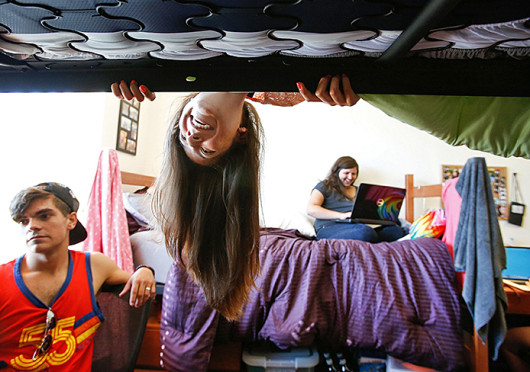
A female student (center) at Cal State Northridge looks under her bunk bed while inside her dorm room Aug. 26. Privacy Pop is a personal tent that can be pitched in a dorm room to add extra privacy.
The college lifestyle offers students the means to be constantly surrounded by like-minded and driven individuals with propensities for staying up late and making regrettable decisions, but when it’s time to end the night early to dive into schoolwork or massive multiplayer online role-playing games, Privacy Pop offers students the ability to be secluded from outside distractions.
Privacy Pop is a bed accessory that wraps around one’s mattress creating a personal tent.
It can be purchased in sizes fitting twin to queen sized beds.
“This advanced bed tent was created especially for college students living in dorms, kids and teenagers that share a room with their siblings and people of all ages who share rooms to cut down on rent costs,” according to the product’s website.
Dena Roché, a publicist from Orca Communications Unlimited, LLC told The Lantern via email that the Privacy Pop was designed to block out light in order to provide ideal sleeping conditions for people who work nights shifts and try to sleep during the day.
“The Privacy Pop was featured for its sleep promotion qualities on ‘The Doctors’ TV show and was highlighted on the DIY Network’s, ‘I Want That’,” Roche said.
Privacy Pop is made of a water repellent fabric and comes suited with double-sided zippers, mesh windows, a portable carrying bag and electronic port openings giving students the privacy and access to power sources needed to leave NSA agents disturbed by the habits of sexually frustrated teenagers.
Still remaining is the question of whether or not students would be interested enough in the potential benefits of Privacy Pop to spend more than $100 turning their beds into outdoor camping equipment.
When asked about Privacy Pop, many students were disinterested with several even walking away without giving a response and sporting perturbed looks.
This reporter admits he could have phrased his question better than to ask if anyone had any interest in pitching a tent in his or her bed.
Kyle Banfill, a fourth-year in English, said he believes purchasing Privacy Pop would be frivolous spending.
“Privacy was never really an issue when I was living in the dorms or even last year when sharing a room in a house,” Banfill said. “If I ever needed privacy, my roommates always respected me enough to oblige.”
University Residences and Dining Services was unable to provide an answer when asked if Privacy Pop would be permitted for use in dormitories; this reporter was referred to a Dave Isaacs, spokesman for the Office of Student Life, who said there is no policy in place prohibiting students from using such a product in the dorms.
Problems would only arise if students on top bunks or lofts used the product and interfered with fire-safety equipment, Isaacs said.
With a price tag surpassing $100 and a reported lack of interest, Privacy Pop may never have the opportunity to seclude OSU students to lives of social deprivation and World of Warcraft.


